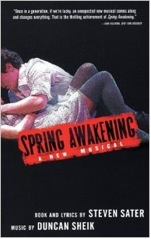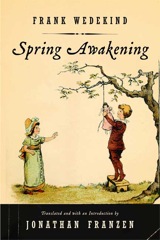 As you may already know, Duncan Sheik and Steven Sater’s Spring Awakening is a musical adaptation of the stage play written by German playwright Frank Wedekind in 1891. Even though most of the dialogue was pulled directly from the original script, it still took almost eight years, from its initial conception in 1999 to its Broadway premier in 2006, to get the musical version to where it is today. And there are some key differences that go beyond the mere addition of songs to the originally straight dramatic text:
As you may already know, Duncan Sheik and Steven Sater’s Spring Awakening is a musical adaptation of the stage play written by German playwright Frank Wedekind in 1891. Even though most of the dialogue was pulled directly from the original script, it still took almost eight years, from its initial conception in 1999 to its Broadway premier in 2006, to get the musical version to where it is today. And there are some key differences that go beyond the mere addition of songs to the originally straight dramatic text:
In the musical, the opening song “Mama Who Bore Me” is derived from a monologue Wendla delivers in Act 2 of the original text.
The entire scene during which Wendla questions her mother about the true nature of how children come to be doesn’t occur until about halfway through the original play.
 There are many more distinct adult characters in the original text.
There are many more distinct adult characters in the original text.
The musical cut multiple adult characters, and also designated that all adult roles were to be played by one male and one female actor.
There is no mention of sexual abuse in the original text.
Sexual abuse was something not talked about at the time it was written, and the vast majority of Spring Awakening was inspired by Wedekind’s own experience or those of his close friends.
The sex between Wendla and Melchior is non-consensual in the original text.
In Wedekind’s original play, Melchior rapes Wendla. The musical version turns this into a consensual act, giving Wendla more control and making Melchior more sympathetic.
After Moritz’ suicide in the musical, his father is depicted falling down in grief at the end of “Left Behind”, whereas he rejects him saying “The boy was nothing to me,” in the original text.
The concept of parenting is vastly different today, and this seems to be a change acknowledging that fact. While the play is set in the 1890s, the audience still lives in the early 21st century making it extremely difficult for contemporary audiences, particularly parents, to reconcile this shunning of a son after having lost him.
In the musical Wendla is taken to an abortionist by her mother in addition to the “French remedy” (code for abortion pill) she is prescribed in the original text.
This addition of seeing Wendla taken to an abortionist is done largely in the spirit of “showing instead of telling,” and provides more closure to her story.
The musical cuts out the part of the Masked Man who convinces Melchior not to kill himself in the original text.
By giving Melchior himself the power to stop himself, the musical version gives adolescents today the message that they have the power to take control of their own lives.
Moritz comes back and tries to convince Melchior to kill himself at the end of the original text. However the musical is much clearer about making Melchior the protagonist throughout, so this change in Mortiz’ attitude helps clear Melchior’s conscious of having played a role in his friend’s suicide.
Wendla does not appear again after she dies in the original text.
But much like the Moritz’ appearance in the musical version, Wendla’s presence offers closure for Melchior, absolving him of any residual guilt he has placed on himself for her death.